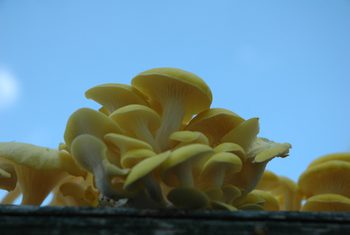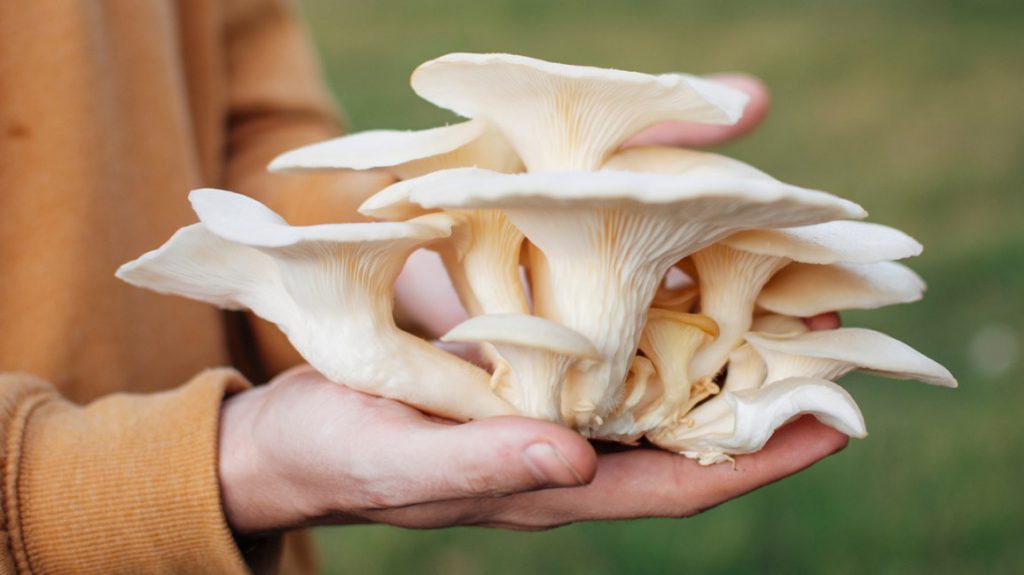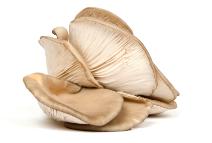Call us to place your order +254 721 510369 | +254 736 325749
Oyster mushrooms: Nutritional and Medicinal properties
- Vegetables
- October 22, 2021
- 0

Oyster mushrooms are edible mushrooms with a shape similar to a shell. There are various sub-species and they come in different colors: white, yellow, cream beige ,grey, blue and even pink. These mushrooms , whose cultivation is nowadays widespread over the world, are found growing wild on hardwoods in the forest. They secrete enzymes that break down the organic bonds in wood into smaller molecules.
The Oyster mycelium is ravenous! It will eat through wood, paper, coffee grounds and even petroleum products. This last characteristic has been used successfully to clean the environment off oil spills at high sea that have reached seashores. The mycelia will kill and eat nematodes ( small roundworms) and bacteria, making them one of the few carnivorous mushrooms.
To date, few scientific studies have focused on oyster mushrooms. There is therefore a lack of clinical trials testing the effects of oyster mushrooms on human health. Yet some preliminary research has examined the potential benefits of this fungus. What follows is a summary of some findings from the available research.

Oyster mushrooms that have been dried in the sun, whether whole or ground, have been exposed to sunlight long enough to produce a substantial additional amount of vitamin D.
Nutritional properties
One cup of diced oyster mushrooms has 28 calories, 2 grams of fiber and 3 grams of protein, but less that one gram of fat. It is a good source of iron, niacin, vitamin D ,vitamin B6, potassium folate and antioxidants.
A man will get 5% of his daily recommended intake of both fiber and protein per serving, whereas a woman will gain 6% of her daily protein requirement and 8 % of her recommended dietary fiber.Both will get 8% of their daily requirement of potassium, folate and vitamin B6 in a regular serving of oyster mushroom.
Iron: A cup of cooked oyster mushrooms will provide 6% of a woman’s daily requirement of iron or 12% of a man’s recommended intake. Iron is fundamental to move oxygen through the blood and into all organs. It is also crucial to create enzymes connected with the production of energy and the removal of toxins from the bloodstream by the liver. T-lymphocytes are iron-dependant. T-lymphocytes are in charge of destroying viruses and tumor cells.

Estimates place the percentage of vitamin D contained in a cup of cooked oyster mushrooms which have been previously dried in the sun and reconstituted thereafter at 15 to 20% of the recommended daily intake.
Niacin: An important number of enzymes depend on niacin to function ,activating several biochemical reactions in our body: metabolizing fats, proteins and carbohyfrates, balancing cholesterol, repairing damaged DNA. A man will gain 25% of his recommended daily intake; a woman will get 29% of hers, with a normal serving of cooked oyster mushrooms.
Vitamin D: Mushrooms are one of the few foods of non-animal origin which turn out to be a good source of Vitamin D. They contain ergosterol , which becomes vitamin D when exposed to ultraviolet rays. Vitamin D is instrumental in the absorption of calcium, as well as having a role in protecting our heart lowering blood pressure and contributing to the creation of enzymes having to do with growth and our immune system.
Oyster mushrooms that have been dried in the sun, whether whole or ground, have been exposed to sunlight long enough to produce a substantial additional amount of vitamin D. Estimates place the percentage of vitamin D contained in a cup of cooked oyster mushrooms which have been previously dried in the sun and reconstituted thereafter at 15 to 20% of the recommended daily intake.
Antioxidants: Oyster mushrooms and other types of edible mushrooms are rich in ergothioneine, an antioxidant which fights inflammation. Oyster mushrooms are one of the best sources of this antioxidant which , among other properties, is responsible for preventing the buildup of plaque in the arteries, prelude to cardiovascular disease.

Medicinal properties
In addition to their nutritional value they have medicinal properties. In herbal medicine, proponents claim that oyster mushrooms may help to treat the following health problems:
- atherosclerosis
- diabetes
- high cholesterol
- respiratory tract infections
In addition, oyster mushrooms are purported to stimulate the immune system and protect against some forms of cancer.
Oyster mushrooms produce statins, compounds that reduce the ldl (low density cholesterol or “bad” one), by their action on the liver receptors which promotes the elimination of the bad cholesterol from the body.

Oyster mushrooms are purported to stimulate the immune system and protect against some forms of cancer.
A preliminary study published in journal of physiology and biochemistry in 2013 found that oyster mushrooms may reduce cholesterol levels. In tests on rats, the study’s authors observed that treatment for seven days with an oral oyster mushroom extract helped increase the animals’ antioxidant status and decreased their levels of cholesterol and triglycerides. High triglyceride levels have been associated with an increased risk of cardiovascular disease.
In another study of 89 diabetic patients, oyster mushroom consumption significantly reduced blood glucose, blood pressure, triglycerides and cholesterol without ill effects on the liver or kidneys
In addition, a 2015 study found evidence that the dietary fiber component of oyster mushrooms (Pleurotus ostreatus) may be useful in reducing triglyceride accumulation in the liver.
The polysaccharides contained in oyster mushrooms , known as beta-D-glucans ( specifically pleuran, which is one polysaccharide isolated from the mushroom),seem to stimulate the immune system, according to studies conducted on animals.

In another study of 89 diabetic patients, oyster mushroom consumption significantly reduced blood glucose, blood pressure, triglycerides and cholesterol without ill effects on the liver or kidneys
This stimulation of the immune system has been confirmed by another small study published in the Journal of Traditional and Complementary Medicine in 2015. For the study, participants ingested an oyster mushroom extract for eight weeks. At the study’s end, researchers found evidence that the extract may have immune-enhancing effects.
Some preliminary research indicates that oyster mushrooms may possess cancer-fighting properties. This research includes a study published in International Journal of Oncology in 2008, in which tests on human cells demonstrated that an oyster mushroom extract may suppress the growth and spread of breast cancer and colon cancer.
Additionally, a mouse-based study published in the International Journal of Medicinal Mushrooms in 2011 determined that an oyster mushroom extract may fight tumor growth, in part by activating certain immune cells.

Oyster mushroom consumption significantly reduced blood glucose, blood pressure, triglycerides and cholesterol without ill effects on the liver or kidneys
Caution:
Although oyster mushrooms purchased at a grocery store are generally considered safe when consumed as a food (when properly handled), some individuals may experience an allergic reaction to this fungus.
Use caution when trying them for the first time. Some people are allergic to their spores.
Even though oyster mushrooms are considered safe to eat, they may cause an upset stomach when consumed in large amounts.
Due to a lack of research, little is known about the safety of taking oyster mushrooms in dietary supplement form. The safety of mushroom supplements in pregnant women, nursing mothers, children, and those with medical conditions or who are taking medications has not been established.

Oyster mushrooms have a sweet scent that is often described like aniseed or liquorice. They cook in a few minutes and one of the most common ways of preparing them, is stir fried with olive oil .some herbs and spices of your choice and garlic.
Mode of consumption
Oyster mushrooms have a mild, nutty flavor that goes well in soups, sauces, stews, vegetable casseroles.
They may be dried and reconstituted by soaking them in water from some 15 minutes or so.
They have a sweet scent that is often described like aniseed or liquorice. They cook in a few minutes and one of the most common ways of preparing them, is stir fried with olive oil .some herbs and spices of your choice and garlic.
For more information tune to YouTube:
https://www.youtube.com/watch?v=0E4Id9Unf5I
https://www.youtube.com/watch?v=wIbEJFoMRnU
https://www.youtube.com/watch?v=mjAk61Jawuc
https://www.youtube.com/watch?v=dXk6H1UrtU0
https://www.youtube.com/watch?v=fuqYfW-RTiY
Disclaimer
This content is strictly the opinion of its author and is meant for informational and educational purposes only. It is not intended to provide medical advice or to take the place of medical advice , diagnosis or treatment from a personal physician.
Readers of this content are advised to consult their doctors or qualified health professionals regarding specific health questions. Neither the author nor publisher of this content takes responsibility for possible health consequences of any person or persons reading or following the information in this educational content.
All readers of this content, especially those taking prescription or over-the-counter medications, should consult their physicians before beginning any nutrition or supplement or lifestyle programme.



